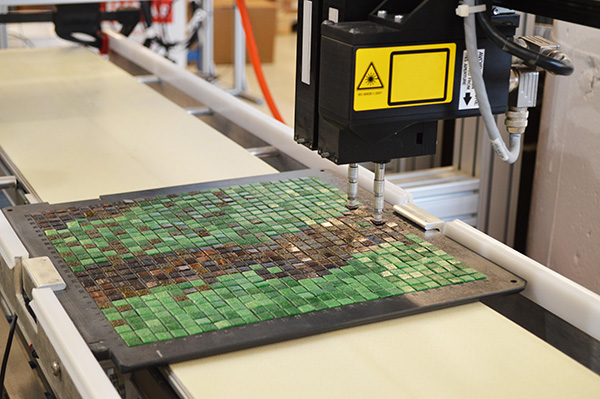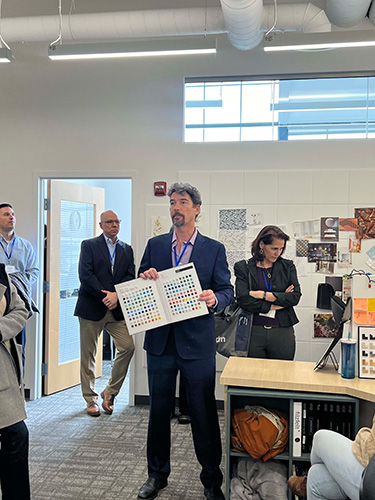The 6th generation of Artaic’s manufacturing robots, offers increased speed and complexity, higher capacity, and precision accuracy.

Boston, MA – Artaic, a leading mosaic manufacturer that utilizes robotic technology and innovative design tools to customize, design, and fabricate award-winning mosaic installations, is thrilled to announce the launch of “Apollo,” the sixth generation of the brand’s proprietary robots for the fabrication of mosaic artwork.
Apollo builds on the foundational technology of Artaic’s fifth-generation robot, Artemis, and over 17 years of innovating and improving manufacturing processes. The result is significant production capacity, faster throughput, and more accurate placement of a wider variety of tile types, including Vitreous and Sintered Glass, Glazed and Unglazed Porcelain, and Natural Stone, for which Artemis was previously limited. Apollo will process virtually any tile material, finish, and size, 1” or less. Artemis was five times faster than Artaic’s first-generation robot, and Apollo will be four times faster again than Artemis.
“Artaic has a long history of continuous investment in advanced technology. I’m proud to say that Apollo is not just an upgrade; it’s a quantum leap,” says Ted Acworth, Founder and CEO of Artaic. “Building on Artemis’ foundation of a truly innovative, radical manufacturing approach, Apollo is improved in every way and is a commercially ‘hardened’ version of that advancement. We can’t wait to see what mosaic artworks our team of expert craftspeople will be able to create for our clients using Apollo.”
Apollo’s processes and technology are a dramatic enhancement to that of its predecessor, especially as it solves Artemis’ biggest challenge – tile feeding and sorting. With Apollo, the Artaic team utilizes Tylist™, the brand’s proprietary mosaic coding software, to determine the tile colors and amounts needed. The Tylist™ “blueprint” is then sent to Apollo, which reads the code and produces the mosaic. Due to Apollo’s development, Artaic’s craftspeople can now pour bulk tile into Apollo’s input hoppers and receive a series of assembled 12” x 12” mosaic sheets, making up a pre-fitted kit ready for installation. Its new tile feeding system and optimized production strategy enable efficient handling of complex designs and improved accuracy of the pick-and-place arms with a variety of tile materials.
The first project that will be produced using Apollo is a custom public art mural of 1,615.26 ft² using 1,062,500 tiles of 54 different colors including gold and white gold for a client in Texas.
Significantly, Apollo marks a major step forward in Artaic’s ability to keep its manufacturing domestic, Made in the USA, enabling the Boston-based team to respond more rapidly to customer needs and produce custom mosaics at a lower cost and higher output per worker hour. Artaic’s commitment to excellence is embodied in its skilled team members who craft the mosaics. Their work is enhanced and supported by the technology, which elevates the productivity and the overarching craftsmanship in the art of mosaic creation. This advancement not only bolsters local manufacturing but also ensures that each mosaic is crafted with the utmost care and precision, overseen by an expert human craftsperson, reflecting the unique vision of each client.
The inspiration behind Apollo’s name is as ambitious as the robot’s capabilities. Named after Artemis’s twin brother in Greek mythology, Apollo symbolizes speed and precision, mirroring the space missions that share its name. The choice reflects the innovative spirit of Artaic’s founder, Ted, a former NASA rocket scientist, embodying the fusion of art, science, and technology.
The development of Apollo was possible with support from Massachusetts Technology Collaborative’s Massachusetts Manufacturing Accelerate Program (MMAP) and Advanced Manufacturing Collaborative (AMC).

ABOUT ARTAIC
Artaic specializes in the design, fabrication, and assembly of award-winning mosaics, employing cutting-edge robotic technology and innovative design tools. Artaic’s proprietary Tylist™ software enables its in-house design team to create custom mosaics from source imagery of all mediums—whether drawings, photographs, logos, or ideas and concepts. With a wide range of materials, including vitreous glass, sintered glass, stone, and glazed porcelain, Artaic’s team ensures each creation is distinct and tailored to the client’s vision. At the heart of Artaic’s philosophy is the elevation of the tile mosaic to an art form. Whether introducing a distinctive artistic element to a project or translating an artist’s work into a new medium, Artaic fosters a reevaluation of tile as a powerful element of design and art. Artaic also offers a catalog of preconceived design collections—such as Flourish, Splash!, Lasting Rugs, and Verge—that can be customized to fit projects of any scale and made unique by an expansive material and color palette. The Boston-based company’s tailored approach and unique manufacturing process increase design flexibility and artistic expression while decreasing lead time and cost, making it a go-to resource for architects, interior designers, and artists across the globe.
PRESS CONTACT:
Cody Suher
Associate Vice President
UpSpring PR
T: 646.722.8146
E: cody@upspringpr.com
Tune in for a timely conversation with Susan Spence, MBA, the new Chair of the ISM Manufacturing Business Survey Committee. With decades of global sourcing leadership—from United Technologies to managing $25B in procurement at FedEx—Susan shares insights on the key trends shaping global supply chains and what they mean for the manufacturing outlook.